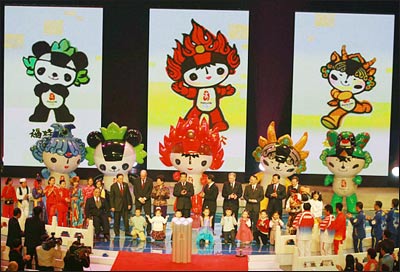In the early 20th century, to become a member of the Olympic family was only a dream for the Chinese. Before the People's Republic of China was founded in 1949, Chinese athletes had participated in three Olympic Games but had returned empty-handed. Since 1949, China has participated in six summer and eight winter Olympics, winning 112 gold medals in summer Olympics. At the Los Angeles, Barcelona and Atlanta Olympics, China came fourth in the gold medals table, and second at the Athens Olympics.
In 1979 China resumed its legitimate membership of the International Olympic Committee (IOC). In 1981 He Zhenliang was elected an IOC member, marking a new period in the relations between China and the Olympics. From then on, Chinese sports circles started to popularize and promote the Olympics. An important part of their work was to have the Chinese people, representing one fifth of the world's population, share the honor and joy of hosting the Olympic Games, thus reflecting the Olympic principle of inclusivity. In July 2001, Beijing finally succeeded in its bid to bring the 2008 Olympic Games to its ancient capital with a history of 3,000 years.
The Beijing Olympic Organizing Committee (BOOC), established at the end of 2001, set the themes for the 2008 Games as "Green Olympics," "High-tech Olympics" and "Humanistic Olympics." Since 2003, 30 Olympic venues have been started, following public bidding for their design and construction. Seven venues, including the National Stadium and the National Swimming Center, are of exquisite and ingenuous design, ushering in a new period of poetic architecture for Beijing. The centerpiece of the 2008 Games will be the "Birds Nest" National Stadium. With a capacity of 100,000 spectators, the stadium will host the opening and closing ceremonies as well as track-and-field events.
According to the budget released by BOOC in September 2003, construction of the venues will cost about US$2 billion and the financing system framework has been determined. Beijing will spend 180 billion yuan on infrastructure construction, much of the expenditure devoted to 142 large-scale projects including high-speed transportation networks, environmental improvements and creation of information systems. Another plan is to exploit the experience of preparing and hosting the 2008 Olympics to make Beijing into an international center for sport.
 |
On November 11, 2005, the official mascots of the Beijing Olympics made their debut. The mascots consist of five "Fuwa" lucky dolls, namely Beibei, Jingjing, Huanhuan, Yingying and Nini, whose individual names link to sound like the expression "Beijing huanying ni" (welcome to Beijing). Their shapes resemble those of the Olympic flame, the panda, the Tibetan antelope, swallow and fish respectively, and each one takes a different color of the Olympic Rings ? red, orange, blue, green and black.

